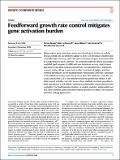Feedforward growth rate control mitigates gene activation burden
Author(s)
Barajas, Carlos; Huang, Hsin-Ho; Gibson, Jesse; Sandoval, Luis; Del Vecchio, Domitilla
DownloadPublished version (1.323Mb)
Publisher with Creative Commons License
Publisher with Creative Commons License
Creative Commons Attribution
Terms of use
Metadata
Show full item recordAbstract
<jats:title>Abstract</jats:title><jats:p>Heterologous gene activation causes non-physiological burden on cellular resources that cells are unable to adjust to. Here, we introduce a feedforward controller that actuates growth rate upon activation of a gene of interest (GOI) to compensate for such a burden. The controller achieves this by activating a modified SpoT enzyme (SpoTH) with sole hydrolysis activity, which lowers ppGpp level and thus increases growth rate. An inducible RelA+ expression cassette further allows to precisely set the basal level of ppGpp, and thus nominal growth rate, in any bacterial strain. Without the controller, activation of the GOI decreased growth rate by more than 50%. With the controller, we could activate the GOI to the same level without growth rate defect. A cell strain armed with the controller in co-culture enabled persistent population-level activation of a GOI, which could not be achieved by a strain devoid of the controller. The feedforward controller is a tunable, modular, and portable tool that allows dynamic gene activation without growth rate defects for bacterial synthetic biology applications.</jats:p>
Date issued
2022Department
Massachusetts Institute of Technology. Department of Mechanical EngineeringJournal
Nature Communications
Publisher
Springer Science and Business Media LLC
Citation
Barajas, Carlos, Huang, Hsin-Ho, Gibson, Jesse, Sandoval, Luis and Del Vecchio, Domitilla. 2022. "Feedforward growth rate control mitigates gene activation burden." Nature Communications, 13 (1).
Version: Final published version